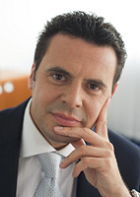By Ben Adams
The Merck Group is pressing ahead with Phase III trials aimed at mimicking the world's biggest selling drug as it looks to create future growth with biosimilars.
The German firm, which recently dropped the KGaA from its name, is testing its biosimilar version of AbbVie's ($ABBV) $13-billion-a-year Humira in patients with chronic plaque psoriasis.
 |
| Merck Group's Michael Soldan |
Humira has been on the market for years and currently has 9 U.S. licenses, including for rheumatoid arthritis, Crohn's disease and, most recently, hidradenitis suppurativa.
But Humira begins to lose its patents in the U.S. this year and in Europe from 2018, leading to a number of firms--including Amgen ($AMGN), U.S. Merck ($MRK), working with Samsung Bioepis, as well as Novartis' ($NVS) Sandoz unit, privately owned Boehringer Ingelheim and now German Merck--planning to launch their own versions of the drug.
Copied versions of the autoinflammatory treatment are in fact already on the market--in 2014, patients in India were the first to receive a Humira biosimilar launched by the Indian company Zydus Cadila.
The road to U.S. approval has proven far trickier, however--just ask Amgen, which has seen its ABP 501 copy delayed and subject to legal disputes, meaning it will likely not be on the American market until 2017.
Merck's candidate, known as MSB11022, is not looking to replicate all of the drug's licenses, but is currently focused on just treating chronic plaque psoriasis.
The AURIEL-Psoriasis study is a randomized, double-blind, active-controlled trial evaluating the efficacy, safety and immunogenicity of MSB11022 against Humira in patients with moderate to severe chronic plaque psoriasis.
The study is expected to recruit around 400 patients across Europe, Asia and North and Central America. It's behind most of the big players in terms of development. And the fact that it's starting small with just one license means sales will likely to be modest--but this is a steady start to a relatively new unit which the firm will hope can shore up revenue in the future.
The company has long been troubled by pipeline setbacks but had something of a turnaround in 2015 thanks to some high-profile partnerships and a particular focus on immuno-oncology.
Set up in 2012, the firm's Biosimilars Business is based in the Canton of Vaud in Switzerland. The unit is developing a biosimilars portfolio focused on oncology and inflammatory disorders, through both in-house research and development expertise in biologics, and partnerships with other biosimilar players.
"With the first patient now treated in our adalimumab [Humira] biosimilar candidate study, we are moving closer to expanding access to affordable, high quality biologics for people living with serious diseases," said Michael Soldan, head of the biosimilar business of Merck.
"At the same time, this milestone supports our broader healthcare strategy to complement our innovative R&D pipeline with biosimilars that serve as important therapeutic options for patients in need."
Biosimilars are set to be sold in the U.S. at around 20% to 30% cheaper than their original equivalents, matching what companies are doing in Europe, which is a little further down the road in regulation terms of allowing these drugs on the market. Citigroup analysts estimating innovative biologics will lose $110 billion in sales to copycats by 2025.
- read Merck's release here (PDF)